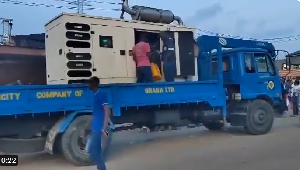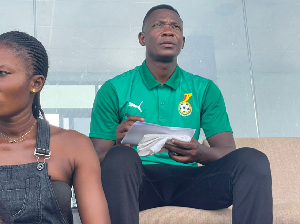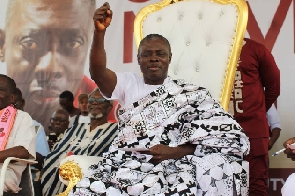Business News of Saturday, 15 February 2014
Source: Kwasi Okoh, Managing Director, ALUWORKS
Aluworks Boss: Country Broke- o, country no broke- o, we dey inside!
All the shenanigans and theories that have been bandied about concerning the state of the economy, the dollarization effect, the rate of cedi depreciation, and foreign exchange or forex accounts will all come to naught, until we finally come to face the fact that we are living beyond our means as a country and attempting to continue to do so by all of these shenanigans.
So far there has been much skirting of the real issue but no-one has yet called a spade a spade.
The story is simply this, our balance of payments is well out of kilter. We are spending much more than we earn. Our imports far outweigh our exports in value terms and until we begin to balance that equation, the exchange rate depreciation can only get worse.
It is simple demand and supply, WASCCE economics. Every person that runs a household knows that you cannot live by purchasing things, even if they are basic necessities, beyond the income of the household, not unless you borrow to fill the gap. And when you can no longer borrow, then you might as well be dead.
That is where the cedi is today. Dying!
It is a trade imbalance issue and not primarily a monetary or fiscal one, although these present issues too. Interventions from those quarters will surely help, like putting bandage on a wound, but they will not fully treat the wounds underneath, which need radical medicine like 100% iodine.
Our revenue is severely under strain. Our main revenue earners are cocoa, gold, non-traditional exports (NTE’s) and oil. These with the exception of the NTE’s, are all commodities. With commodity prices at the current levels, the main players are very reluctant to produce very much. When you are making a loss, every extra production simply increases the loss!
And with all the goings on to do with extra windfall taxes etc that we are desperately trying to use as a lever to ‘prise’ more money out of the already suffering investors, they are not at all enthused about producing at the current levels let alone to increase output. Hence the little they do produce is simply to get enough revenue to cover their basic outgoings and expenses on the ground. Because the output is small (i.e. downscaled), at the current low commodity prices, very little is actually coming in to the coffers of Ghana. It goes for all of them. As for oil the less said about it the better.
The net effect is that the countries revenue has fallen very very sharply.
The Bank of Ghana has been pumping dollars into the economy for a considerably long period. When the recent announcement was made that BOG would pump in $20 million dollars, somehow the word ‘extra’ was missed by all the journalists. In fact it was merely increasing the level of intervention that it had been making. That was, I believe, a signal to everyone that the BOG had come to the end of how much more it could increase its input by.
When you find in your house hold that your revenue is insufficient, you begin to cut your cloth accordingly. It means certain things that you would normally crave just have to be foregone. You start with the easy things like cigarettes, beer and exotic foods, and move on from there.
We are simply importing too much. We must start to balance our books. And we must start with the easy things. Like Toothpicks! Like All sorts of toothpaste! Like All sorts of water!! Like all types of food, particularly those that could, and are grown here! The list is endless if one takes just a casual look at items on display in our supermarkets and even open market places. Traditional African markets selling imported and exotic foods from temperate regions of the world! This country has the capacity to produce and provide a lot of the raw materials that are used for the things we import. If such industries are given a chance, and supported by deliberate policy to import capital goods such as machinery and technology, they will substitute successfully all of these unnecessary imports, and can become world beaters in their own rights. We have plenty of wood so why do we import toothpicks and matches? Let’s give our industries a chance, especially the small scale ones, and let’s have jobs for our people to do. Our cotton industry has died only because we import all those unnecessary textiles.
But we have to face the fact that we really cannot do without imports. Our economy has been grown on the back of imported raw materials. Everything produced in Ghana has some imported element, somewhere up the supply chain. But we must limit such imports to machinery, semi-finished and raw materials that are unavailable locally. The trouble we are in is because more and more finished products are being imported instead of being produced here from raw materials.
It is instructive to note that raw materials exported into the European Union is charged 5% duty upon entry, but any finished goods exported to the same European Union is charged 30% duty upon entry. All the talk about adding value to our primary material before we export semi- finished and finished goods is negated in one fell swoop. What is the lesson we must learn from that?? If this is not recognition of the need to protect one’s own, how else can this be termed? Why is it that we on this side charge the same for raw materials as we charge for finished goods? Should we not be charging low for raw materials and heavily for finished goods that we can produce right here, given the chance. We simply have to learn to produce for our own consumption, and to export only any excess.
We must start to balance the books, slowly reducing imports and producing much more locally, and in that way possible eventually increase our exports. But we must start now!
Step One: What things can easily be produced here, as soon as the import is curtailed? The word is curtailed. We should not ban anything lest we are charged with unfair practice. We should simply impose 200-300% tax or more on all such items so that those who want to still import may do so provided they use their own foreign exchange and not from the Bank of Ghana.
Having done step one, then we begin to get serious.
Step Two: What can be curtailed that will promote on shore small scale business right here in Ghana? What can be curtailed which will have a significant impact on foreign exchange outflow? Shoes, Clothing, toilet paper, second hand fridges, second hand/accident cars not for personal use, all sorts of furniture!! Some of these will take time to be meaningfully produced here because of capital/financial constraints but we must make a start. Where there is the will there is bound to be a way. How about genuine Public Private Partnership?
Step Three: What imports can be curtailed that will increase serious manufacturing and create jobs for the teeming youthful workforce in Ghana? Wax prints/textiles; Cement; Aluminium products; wood products, paper products etc How are we addressing the perception that because of vested interests, we are unable to take steps to make TOR viable and (even retrofitted if that is what it takes to be able to) refine part of the crude from our own oil fields? Can we not revive the cotton, sugar and rubber plantations? Can we not re-start large scale car production from knocked down parts (CKD)? All of these produce jobs and incentivise the technical schools tremendously.
Once we are down that path we should begin to see a medium term balancing of the books, with a long term outlook of completely overturning the equation towards greater GDP and increased prosperity.
Is this not simple?
The worlds’ economy tends to go in swings and cycles, one period up the next period down. So we should not despair. Once we have put these fixes in place, we will be ready to ride the crest of the wave when the economy starts swinging back to the positive. But we have to be ready. There is no escaping the corrective actions that need to be taken now and into the short term, otherwise even the positive times for the rest of the world will be sad times for us, like not preparing your field before the rain.
Sounds like common sense does it not? Meanwhile country broke-0, country no broke-o, we dey inside!!!
Kwasi Okoh, Managing Director, ALUWORKS
13th February 2014.










